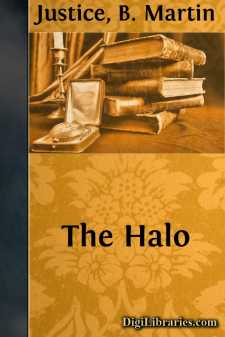Categories
- Antiques & Collectibles 13
- Architecture 36
- Art 48
- Bibles 22
- Biography & Autobiography 813
- Body, Mind & Spirit 142
- Business & Economics 28
- Children's Books 15
- Children's Fiction 12
- Computers 4
- Cooking 94
- Crafts & Hobbies 4
- Drama 346
- Education 46
- Family & Relationships 57
- Fiction 11828
- Games 19
- Gardening 17
- Health & Fitness 34
- History 1377
- House & Home 1
- Humor 147
- Juvenile Fiction 1873
- Juvenile Nonfiction 202
- Language Arts & Disciplines 88
- Law 16
- Literary Collections 686
- Literary Criticism 179
- Mathematics 13
- Medical 41
- Music 40
- Nature 179
- Non-Classifiable 1768
- Performing Arts 7
- Periodicals 1453
- Philosophy 64
- Photography 2
- Poetry 896
- Political Science 203
- Psychology 42
- Reference 154
- Religion 513
- Science 126
- Self-Help 84
- Social Science 81
- Sports & Recreation 34
- Study Aids 3
- Technology & Engineering 59
- Transportation 23
- Travel 463
- True Crime 29
The Halo
Description:
Excerpt
PROLOGUE
A straight stretch of dusty Norman road dappled with grotesque shadows of the ancient apple-trees that, bent as if in patient endurance of the weight of their thick-set scarlet fruit, edged it on both sides.
Under one of the trees, his back against its gnarled trunk, sat an old man playing a cracked fiddle.
He played horribly, wrenching discords from the poor instrument, grinning with a kind of vacant malice as it shrieked aloud in agony, and rolling in their scarred sockets his long-blind eyes.
Beside him, his tongue hanging out, his head bent, sat a yellow dog with a lead to his collar. Far and wide there was to be seen no other living thing, and in the apple-scented heat the screeching of the violin was like the resentful cries of some invisible creature being tortured.
"Papillon, mon ami," said the old man, ceasing playing for a moment, "we are wasting time; the shadows are coming. See the baby shadow apple-trees creeping across the road."
The yellow dog cocked an ear and said nothing.
"Time should never be lost, petit chien jaune—never be lost."
Then with a shrill laugh he ground his bow deep into the roughened strings, and the painful music began again.
The yellow dog closed his eyes....
Suddenly far down the road appeared a low cloud of white dust, advancing rapidly, and until it was nearly abreast of the fiddler, noiselessly, and then, with the cessation of a quick padding sound of bare feet, appeared a small, black-smocked boy, his sabots under his arm, his face white with anger.
"Stop it!" he cried, "stop it!"
The old man turned. "Stop what, little seigneur," he asked with surly amusement. "Does the high road belong to you?"
"You must stop it, I say, I cannot bear it."
The fiddler rose and danced about scraping more hideously than before. "Ho, ho," he laughed, "ho, ho, ho, ho!"
The child threw his arms over his head in a gesture of unconscious melodrama. "I cannot bear it—you are hurting it—I—I will kill you if you do not stop." And he flew at his enemy, using his close-cropped bullet-head as a battering ram.
For some seconds the absurd battle continued, and then, as unexpectedly as he had begun it, the boy gave it up, and as the fiddler laughed harshly, and the fiddle screeched, threw himself on the warm, dusty grass and cried aloud.
There was a pause, after which, in silence, the old man groped his way to the boy and knelt by him. "Hush, mon petit," he beseeched, "old Luc-Ange is a monster to tease you. Do not cry, do not cry."
A curious apple, leaning over to listen, fell from its bough and dropped with a thud into the grass.
The little Norman sat up. "I am not crying," he declared, turning a brown, pugnacious face towards his late foe, "see, there are no tears."
The man touched his cheeks and eyelids delicately with his dirty fingers. "True—no tears. But—why, why did you——"
"I was screaming because that noise was so horrible."
"And—that noise gave you pain?"
Bullet-Head frowned. Like all Normans, he resented his mental privacy being intruded on by questions....


